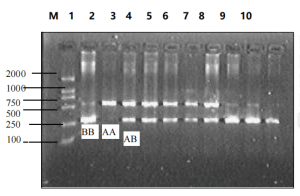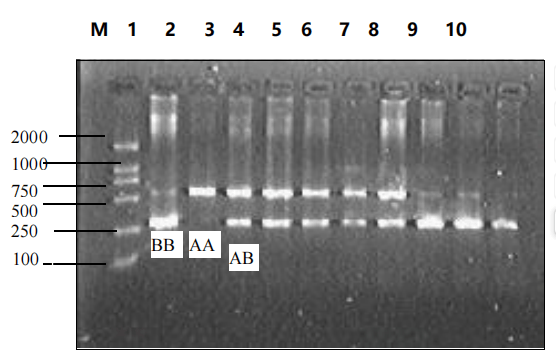je. Objective
Learn and master the basic principles and detection methods of Restriction Fragment Length Polymorphism (RFLP) genetic markers.
Table des matières
BasculerII. Principe
The first generation of molecular genetic markers, RFLP, is based on mutations at the restriction enzyme cutting sites in the genomes of different varieties (individuals). These mutations can include base changes, insertions, deletions, or rearrangements between the enzyme-cutting sites, leading to variations in fragment sizes. These variations can be detected through RAP, restriction enzyme digestion, and agarose gel electrophoresis, allowing comparison of DNA level differences (i.e., polymorphism) between different varieties (individuals). RFLP has been widely used in constructing genomic genetic maps, gene localization, biological evolution and classification, and genetic diversity studies.
III. Instruments, Matériaux, and Reagents
Instruments:
- Electric constant temperature water bath
- Agarose gel electrophoresis and detection system
Materials and Reagents:
- Hind III restriction enzyme
- 10×M Buffer
- PCR product to be analyzed
- DL2000 DNA Marker
- 6×Loading Buffer
- Sterile double-distilled water
- 1.5% gel d'agarose (Note: Contains ethidium bromide (EB), which is carcinogenic; handle with gloves)
- 0.5% TBE (electrophoresis buffer)
IV. Procédure
Hind III Restriction Enzyme Digestion
- Reaction volume: 10 μL in a 0.2 mL Eppendorf tube
- Add the following in order:
- 10×M Buffer: 1 µL
- dH2O: 5.5 µL
- Hind III: 0.5 µL
- PCR product: 3 µL
- Digest at 37℃ in a water bath for 2 heures. Use the entire digestion product for agarose gel detection.
Électrophorèse sur gel d'agarose
- Prepare a 1.5% gel d'agarose.
- Mix 10 μL of the digestion product with 1 μL of loading buffer.
- Perform electrophoresis at a constant voltage of 180V.
- DNA carries a negative charge, so it will migrate from the negative to the positive electrode during electrophoresis.
- Stop electrophoresis when the DNA has migrated to 1/2 à 2/3 of the gel’s length. Observe under a UV detector.
V. Assignment
Write the detailed procedure of this experiment and describe the results you observed (including drawings).

